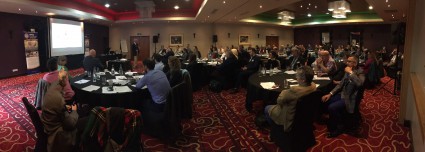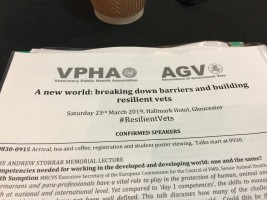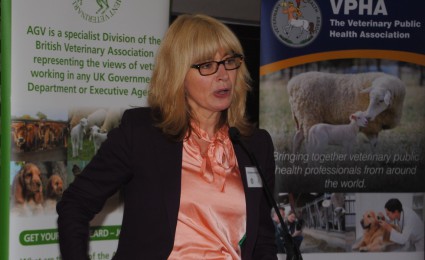VPHA/AGV Autumn 2023 Conference
15 & 16 September 2023
Weetwood Hotel, Leeds
"What can we control?"
In the 4th consecutive VPHA & AGV conference led by UK VPHAmbassadors we will be exploring the roles of vets and allied professionals in “controlling” animal and veterinary public health risks for the benefit of animals, people and the environment.
Click here to register - Early Bird discount by 20 July
Click here for the poster competition
VPHA/AGV Autumn 2022 Conference
“EDUCATING!”
16-17th September 2022
Cambridge Bar Hill, Best Western Hotel CB23 8EU
AND online
VPHA/AGV Autumn 2021 Conference
“WHERE NEXT..?”
Saturday, 25th September 2021
Mercure Bedford Centre Hotel, Bedford
AND online
In September 2021 we met for a wide range of exciting presentations and lively debate on veterinary education & EMS, environment/sustainability, emerging pandemic threats, trade, one health and more!
The programme included a keynote lecture by David Hadrill, Consultant to the Food and Agriculture Organization of the UN (FAO).
For a full programme click here
VPHA/AGV Autumn 2020 Conference
Mining Diamonds
In October 2020 we joined VPHA as they celebrated 60 years of the Veterinary Public Health Association.
Recordings of the lectures are availalbe to both vets and vet students.
To get your free link (and four hours of CPD!) please email your name and current working/studying status to vphaconference@gmail.com
If you do wish to make a donation for the CPD content, VPHA would welcome any voluntary contributions via this paypal link. All proceeds will be spent on Veterinary Public Health undergraduate student opportunities.
VPHA/AGV Autumn 2019 Conference
Sequences and Consequences:
bringing together the strands of life
Saturday 12 October 2019
Dunchurch Park Hotel, Warwickshire, CV22 6QW
VPHA/AGV Spring 2019 Conference
Building resilient vets for the future
23 March 2019
Hallmark Hotel, Gloucester, GL4 6EA
VPHA/AGV Autumn 2018 Conference
Vet's Dilemas: Yes? No? Why?
3 November 2018
Hothorpe Hall, Leicestershire, LE17 6QX
VPHA/AGV Spring 2018 Conference
Brexit and the Vet Profession
17 March 2018
Cedar Court Hotel, Wakefield, WF4 3QZ
The seventh joint VPHA and AGV Conference took place on Saturday March 17th 2018 at the Cedar Court Wakefield.
A full house of over 100 delegates heard from an inspiring group of speakers on a subject relevant to the day to day life and work of everyone in the room.
Those attending included three current Chief Veterinary Officers, three ex-CVOs, a brace of politicians, the BVA president, the FVE president, the RCVS Senior Vice President and an interested and informed audience of vets mainly employed in veterinary public health and Government work.
The new UK Chief Veterinary Officer, Christine Middlemiss, in her first conference engagement since taking office, highlighted the current shortage of vets and the vital work they do for the UK economy. She referred to the recent report by the Migration Advisory Committee and the need to include veterinarians. This is because this work will continue post – Brexit with vets part of the food assurance chain maintaining the UK’s international reputation for health standards, food safety and disease control.
She stressed that our focus on domestic and international horizon scanning for disease threats, the need for vets to monitor imports and border controls and to help UK plc grow our export market, pointed to opportunities for them in the future. Vets are currently seen as trusted advisers and leaders. This will not change. She emphasised the work going on both within and outside Government to tackle the issue of vet shortages, including the Vet capability and capacity project, currently looking at veterinary resources, recruitment and retention and legislation.
The BVA report on Brexit and the Veterinary Profession had brought a number of issues into sharp focus and several of these were covered by John Fishwick, BVA President. Grave concerns about the future of non UK veterinarians working in the UK were of particular relevance to the audience as 95% of veterinarians currently working in veterinary public health are from the EU and Third Countries. John raised the point that this was an issue for academics and specialists too, with 38% of the British College of Veterinary Specialists being non UK graduates. The consensus was that it would be desirable that the veterinary profession was put firmly on the Shortage Occupation List. The Mutual Recognition and accreditation of professional qualifications by the RCVS will continue but this does not give individual veterinary surgeons the right to work in the UK.
Concerns were expressed by both speakers and delegates that new non UK vets will be discouraged from the prospect of working in the UK. Worryingly anecdotal evidence suggested that some non UK vets already working in the UK no longer feel welcome.
Robert Huey CVO Northern Ireland described the dilemma surrounding the border issue in Ireland. The NI Agri-food market is growing, with 50% of current exports going to GB and 14% to Ireland, its biggest ‘external’ market. He described the ‘border conundrum’ of the UK leaving the Customs Union and the Single Market while simultaneously all parties want to maintain a painless border.
Under current EU law, a Border Inspection post is required within 5km of the EU border. For an infra-structure free border to exist, EU law needs to change and this is a legal problem that the EU needs to solve, possibly by a derogation from this principle.
He expressed his concerns regarding the current differences of opinion between the EU and UK over the border question and the implications of any tariffs put in place on trade. Solutions will be expensive for a border of more than 300 miles and 275 crossing points, but a ‘smart border’ solution was needed. The prospect of a “no deal” outcome presents a huge potential problem for the post Brexit era.
Slaven Grbic, President of the Union of Veterinary Hygienists gave a presentation on the impact of Brexit on veterinary public health from a European perspective. He reminded the audience that the UK economy was 1/7 of the EU economy and the risk was that both would lose. Other potential issues and risks would be the loss of UK access to the various surveillance sharing systems in the EU, for example on disease outbreaks, food safety incidents and antimicrobial resistance. No matter what – FVE will continue to support UK vets.
An interesting perspective on ‘Brexit: a reality check’ was given by Lord Kirkhope of Harrogate who is a member of the EU Home affairs sub- committee. As the author of Article 50 in the EU constitution in 2002 he was well placed to explain the intent behind it and possible implications for the UK. The intention was for Article 50 to provide the means for new countries joining the EU to leave if necessary. If a country changed its mind within two years of triggering Article 50, it could withdraw its notification. However any extension to Article 50 needs all other countries to agree and means that the leaving country could no longer unilaterally withdraw their trigger. Another interesting conundrum perhaps?
Lord Kirkhope recognised there were implications for vets as the UK leaves the EU but emphasised that vets will be needed more than ever to monitor trading standards and maintain consumer confidence in the quality of our food. References to the CAP history, international trade and how standards are applied across different countries followed.
Neither Lord Kirkhope nor John Proctor MEP, the second politician to speak, were able to give clarity on the detail of Brexit negotiations as they were not party to them. The aim is a bespoke agreement for the UK and following the implementation/transition period, all politicians will leave Brussels. However all lobby groups will stay as the issues remain and this is an important point to remember for future influencing work by the UK.
The importance of maintaining food and animal welfare standards was recognised by all, with no appetite for a two-tier system for domestic and international consumption as is the case in some third countries currently. Both Lord Kirkhope and John Proctor were somewhat pessimistic about short term prospects for the UK following Brexit but John was clear that UK business has the resilience to find a way through these difficult issues.
Peter Jinman OBE Chairman of the Farmers Club and Chairman of Defra’s Farm Animal Welfare Committee outlined how the veterinary profession has changed since 1973 when he qualified and how the profession needs to adapt to the challenges ahead of us that Brexit will inevitably bring. Peter reminded the audience that in 1973 when the UK joined the ‘EEC’, there were 8,797 practising vets on the RCVS Register. As we leave the EU, there are 24,445.
Lively discussions took place following each of the speakers with the shortage of vets in public health work emerging as a specific topic for action. It was acknowledged that currently very few veterinarians from the UK consider that either veterinary public health work or state veterinary work provides a career path that they would like to follow. And there was much discussion as to how to encourage new graduates in the profession to adopt such career paths, and in addition, given that new veterinary schools are on the horizon in the UK, it would take years for these to be established and thereby enlarge the UK graduate pool that might lead to an increase in numbers of those seeking to have a career in either government or public health.
Rebeca Garcia, current President of the Association of Government Vets, announced the launch of the Government Veterinarians Wellbeing Survey a survey that could help to provide information on the particular issues affecting vets undertaking Government roles, both directly employed or working under contract. She noted that, whilst much of the EU-exit debate focused on current affairs, it is also important to acknowledge the impact this has on people as individuals. AGV, with the support of Government Veterinary Services, and working in close collaboration with the UK CVO, APHA, FSA and VPHA seeks to capture information that could shed light and raise awareness of the multiple challenges faced by Government vets.
Following the conference the AGMs for both VPHA and AGV took place with Collin Willson elected as VPHA President and Rebecca Garcia AGV President.
Thanks are due to the organising committee of Liz Kelly AGV, Rebecca Garcia AGV, Simon Woliter VPHA and Jason Aldiss VPHA.
We all look forward to the next joint Conference in November later this year.
Dr Lewis G Grant MRCVS MBE Senior Vice President VPHA.
Dr Liz Kelly MRCVS Secretary and Junior Vice President AGV
VPHA/AGV Autumn 2017 Conference
Embracing Innovation
4 November 2017
Hellidon Lakes Hotel, Daventry, NN11 6GG
Our conference, themed ‘Embracing Innovation’, had three core sessions on developing, using and preparing for technology.
Speakers and chairs include the UK CVO, Vice President of the RCVS, lecturers from the University of Southampton, APHA, Surrey Vet School and Cefas.
VPHA/AGV Spring 2017 Conference
17 - 18 March 2017
Churchill College, Cambridge
Report of VPHA & AGV Autumn 2016 Conference
2016 VPHA AGV Autumn Conference report.p[...]
Adobe Acrobat document [346.5 KB]
VPHA AGV Joint Conference 7th November 2015
VPHA AGV Autumn Conference
Networking at the VPHA/AGV Conference Dinner
Please see Home Page for details of the next conference when available.





